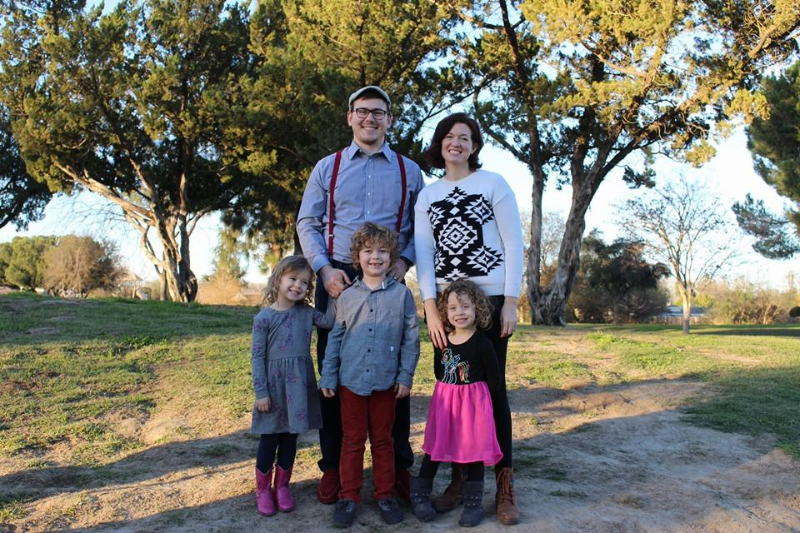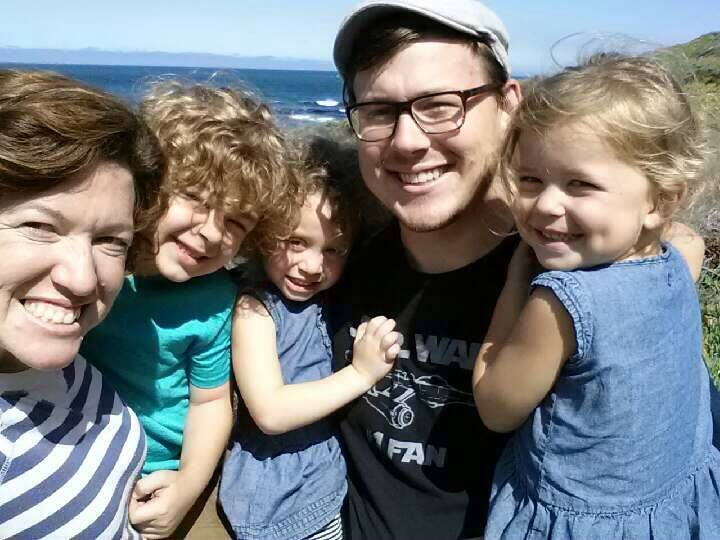“These children did not ask to be in an abusive, neglectful, or other various terrible situations which ended up in them being taken from their families. They did nothing wrong. They deserve love and care just like us and our own children, even if that means our heart gets broken every time they leave.”
Rachel and Marcus Glascock have an epic love story. In 2006, they met at a friend’s house for a Fourth of July Party in their native state of California, United States – by October they were married. They both knew right away they would be in love and raise a family one day. But Rachel and Marcus never dared imagine what kind of a family they would have.
In 10 years of marriage, the Glascocks have had 13 children. Rachel, however, only gave birth to two of them. Through foster care they opened their house, and hearts, to 11 children, and even adopted a 4-year-old girl. To many of their friends and family, Rachel and Marcus are carrying burdens that they feel would be too hard to bear themselves. Rachel told the IPF:
“There are so many people who have had thoughts of being a foster parent, but are afraid to move forward due to the negative stigmas surrounding foster parents and foster children.”
Some of these stigmas, the Glascocks feel, need to be debunked. On International Day of Families, the IPF takes a closer look at the family dynamics of the Glascocks home.
Heartbreak involved in foster care
The Glascocks constantly come across people who believe foster care is a beautiful idea, but feel too vulnerable to do it themselves. The fear of learning to love a child and then having them leave is too difficult for many.
“I have heard that from more people than I can count,” Rachel said, remarking that she finds it hard to engage with this attitude. To her, foster care is not a selfish business; she and her husband don’t foster children to benefit themselves, their marriage, or bank account.
“It really is too hard, but it is not about us, it is about the child.”
Children, she said, don’t ask to be neglected, and she feels fortunate to have enough love to give to as many children as she can. Foster children come from broken homes, where a loving environment is not the norm. Through even the shortest stays, the Glascocks are able to teach these children what love and family means. Despite the pain they feel when another child leaves the family, the Glascocks wants to do it over and over again. Rachel explained:
“These children did not ask to be in an abusive, neglectful, or other various terrible situations which ended up in them being taken from their families. They did nothing wrong. They deserve love and care just like us and our own children, even if that means our heart gets broken every time they leave.”

Rachel are Marcus believe that foster care children need to have any behavioural issues tackled through love, stability and education. [Image credit: Marcus and Rachel Glascock]
Taking in children from broken homes
People approach Rachel and Marcus with the concern that the broken families foster children come from are a source of danger. Many believe these children are just as bad as their parents. Rachel doesn’t disagree completely:
“It is true that foster children, in my experiences, have a lot of behavior issues.”
However, she explained that these children’s behavioral patterns are not inherent vices, but lack of care from their birth parents. Some children have been hurt and neglected when they joined the Glascocks home – and their behavior is a reflection of that. Rachel believes that showing these children compassion and family values is changing their life for the better.
The moment they enter their house, the Glascocks cease thinking of the children as temporary visitors. If their behavior is bad, it’s their responsibility to change that. Rachel believes that “hurting children are everyone’s responsibility” and, just like her biological children, she couldn’t turn away from them:
“They are so eager to learn, to have structure, to have a stable loving environment… when they do, you see tremendous changes very quickly.”

The Glascocks have seen the positive effects foster care children have had on their biological children. [Image credit: Marcus and Rachel Glascock]
Effects of foster children on biological children
Rachel admitted that the reality of some foster children having a negative effect on her own children does scare her. However, she insisted that the good outweighs the bad. She believes that the situation teaches her children compassion and acceptance, even when circumstances are challenging – and the couple’s biological children have benefitted from the family dynamics well. Marcus said:
“Because our children have been siblings to so many foster children, they have turned into some of the most compassionate and forgiving people that I have ever met.”
Their son, Micah, took two sweaters on an outing in case someone beside him got cold. Meanwhile, their daughter, Adelynne, has been crucial to their adoptive daughter, Amelia’s, healing process after her birth mother passed away. Rachel and Marcus believe that educating their children to accept new family members have made them more accepting human beings.
Foster parents “in it for the money”
The Glascocks are dumbfounded when someone accuses foster parents of being in it for the money or being just as abusive as the children’s birth parents. They believe that this stigma certainly doesn’t apply to the majority of foster parents, and that the financial benefits are not big enough to substantially contribute to a family’s wealth.
Rachel said that seeing children in need breaks her heart, but she has realised she can’t save them all. Marcus recently had to ask his wife to put a hold on foster care, as her health was deterioating. However, he insisted that they would return to foster care as soon as they could and continue opening their homes and hearts to vulnerable children again.

